| Listing 1 - 10 of 63 | << page >> |
Sort by
|
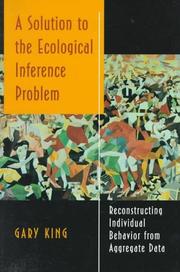
ISBN: 0691012407 0691012415 1400849209 9781400849208 9780691012414 9780691012407 1299840760 Year: 1997 Publisher: Princeton, N.J. : Princeton University Press,
Abstract | Keywords | Export | Availability | Bookmark
 Loading...
Loading...Choose an application
- Reference Manager
- EndNote
- RefWorks (Direct export to RefWorks)
This book provides a solution to the ecological inference problem, which has plagued users of statistical methods for over seventy-five years: How can researchers reliably infer individual-level behavior from aggregate (ecological) data? In political science, this question arises when individual-level surveys are unavailable (for instance, local or comparative electoral politics), unreliable (racial politics), insufficient (political geography), or infeasible (political history). This ecological inference problem also confronts researchers in numerous areas of major significance in public policy, and other academic disciplines, ranging from epidemiology and marketing to sociology and quantitative history. Although many have attempted to make such cross-level inferences, scholars agree that all existing methods yield very inaccurate conclusions about the world. In this volume, Gary King lays out a unique--and reliable--solution to this venerable problem. King begins with a qualitative overview, readable even by those without a statistical background. He then unifies the apparently diverse findings in the methodological literature, so that only one aggregation problem remains to be solved. He then presents his solution, as well as empirical evaluations of the solution that include over 16,000 comparisons of his estimates from real aggregate data to the known individual-level answer. The method works in practice. King's solution to the ecological inference problem will enable empirical researchers to investigate substantive questions that have heretofore proved unanswerable, and move forward fields of inquiry in which progress has been stifled by this problem.
Conclusie --- Conclusion --- Gevolgtrekking --- Inference --- Inference (Logic) --- Political statistics --- #SBIB:303H10 --- #SBIB:003.IO --- Ampliative induction --- Induction, Ampliative --- Reasoning --- Political science --- Statistics --- Methoden en technieken: algemene handboeken en reeksen --- Statistical methods --- Inference. --- Political statistics. --- Political science - Statistical methods.
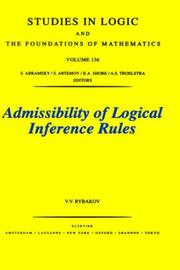
ISBN: 0444895051 9780444895059 9786611019228 1281019224 0080525997 9780080525990 Year: 1997 Volume: 136 Publisher: Amsterdam ; Lausanne ; New York Elsevier
Abstract | Keywords | Export | Availability | Bookmark
 Loading...
Loading...Choose an application
- Reference Manager
- EndNote
- RefWorks (Direct export to RefWorks)
The aim of this book is to present the fundamental theoretical results concerning inference rules in deductive formal systems. Primary attention is focused on: admissible or permissible inference rules the derivability of the admissible inference rules the structural completeness of logics the bases for admissible and valid inference rules. There is particular emphasis on propositional non-standard logics (primary, superintuitionistic and modal logics) but general logical consequence relations and classical first-order theories are also considered. The book is
Conclusie --- Conclusion --- Gevolgtrekking --- Inference --- Inference (Logic) --- Logic [Symbolic and mathematical ] --- Logica [Symbolische en wiskundige ] --- Logique symbolique et mathémathique --- Logica matematica --- Logica. --- Modeltheorie. --- Logic, Symbolic and mathematical. --- Inference. --- Logique symbolique et mathématique --- Inférence (Logique) --- Ampliative induction --- Induction, Ampliative --- Reasoning --- Algebra of logic --- Logic, Universal --- Mathematical logic --- Symbolic and mathematical logic --- Symbolic logic --- Mathematics --- Algebra, Abstract --- Metamathematics --- Set theory --- Syllogism
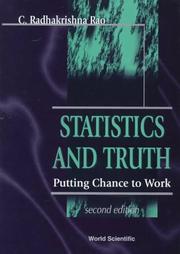
ISBN: 1281347884 9786611347888 9812384952 9789812384959 9810231113 9789810231118 9781281347886 6611347887 Year: 1997 Publisher: Singapore ; River Edge, N.J. : World Scientific,
Abstract | Keywords | Export | Availability | Bookmark
 Loading...
Loading...Choose an application
- Reference Manager
- EndNote
- RefWorks (Direct export to RefWorks)
"Written by one of the top most statisticians with experience in diverse fields of applications of statistics, the book deals with the philosophical and methodological aspects of information technology, collection and analysis of data to provide insight into a problem, whether it is scientific research, policy making by government or decision making in our daily lives.The author dispels the doubts that chance is an expression of our ignorance which makes accurate prediction impossible and illustrates how our thinking has changed with quantification of uncertainty by showing that chance is no longer the obstructor but a way of expressing our knowledge. Indeed, chance can create and help in the investigation of truth. It is eloquently demonstrated with numerous examples of applications that statistics is the science, technology and art of extracting information from data and is based on a study of the laws of chance. It is highlighted how statistical ideas played a vital role in scientific and other investigations even before statistics was recognized as a separate discipline and how statistics is now evolving as a versatile, powerful and inevitable tool in diverse fields of human endeavor such as literature, legal matters, industry, archaeology and medicine.Use of statistics to the layman in improving the quality of life through wise decision making is emphasized." -- Publisher's description.
Mathematical statistics. --- Mathematics --- Statistical inference --- Statistics, Mathematical --- Statistics --- Probabilities --- Sampling (Statistics) --- Statistical methods --- Mathematics. --- Math --- Science
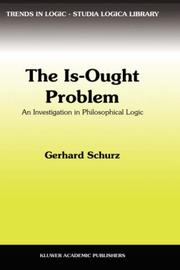
ISBN: 0792344103 9780792344100 9048147956 9401733759 Year: 1997 Volume: v. 1 Publisher: Dordrecht: Kluwer Academic Publishers,
Abstract | Keywords | Export | Availability | Bookmark
 Loading...
Loading...Choose an application
- Reference Manager
- EndNote
- RefWorks (Direct export to RefWorks)
Can OUGHT be derived from IS? This book presents an investigation of this time-honored problem by means of alethic-deontic predicate logic. New in this study is the leitmotif of relevance: is-ought inferences indeed exist, but they are all irrelevant in a precise logical sense. New proof techniques establish this result for very broad classes of logics. A profound philosophical analysis of is-ought bridge principles supplements the logical study. The final results imply incisive limitations for the justifiability of ethics as opposed to empirical science.
Logic. --- Inference. --- Deontic logic. --- Logique --- Inférence (Logique) --- Logique déontique --- Hume, David, --- Inférence --- Inférence (Logique) --- Logique déontique --- Deontic logic --- Inference --- Logic --- Argumentation --- Deduction (Logic) --- Deductive logic --- Dialectic (Logic) --- Logic, Deductive --- Intellect --- Philosophy --- Psychology --- Science --- Reasoning --- Thought and thinking --- Ampliative induction --- Induction, Ampliative --- Inference (Logic) --- Logic, Deontic --- Duty --- Modality (Logic) --- Methodology --- Hume, David --- Logique. --- Inférence. --- Logique déontique. --- Philosophy and social sciences. --- Philosophy and science. --- Philosophy of the Social Sciences. --- Philosophy of Science. --- Science and philosophy --- Social sciences and philosophy --- Social sciences --- Inférence. --- Logique déontique.
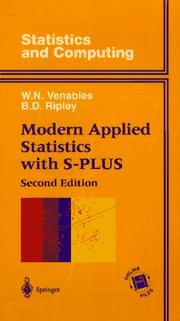
ISBN: 0387982140 1475727216 1475727194 Year: 1997 Publisher: New York (N.Y.) : Springer,
Abstract | Keywords | Export | Availability | Bookmark
 Loading...
Loading...Choose an application
- Reference Manager
- EndNote
- RefWorks (Direct export to RefWorks)
S-PLUS is a powerful environment for the statistical and graphical analysis of data. It provides the tools to implement many statistical ideas which have been made possible by the widespread availability of workstations having good graphics and computational capabilities. This book is a guide to using S-PLUS to perform statistical analyses and provides both an introduction to the use of S-PLUS and a course in modern statistical methods. S-PLUS is available for both Windows and UNIX workstations, and both versions are covered in depth. The aim of the book is to show how to use S-PLUS as a powerful and graphical system. Readers are assumed to have a basic grounding in statistics, and so the book is intended for would-be users of S-PLUS, and both students and researchers using statistics. Throughout, the emphasis is on presenting practical problems and full analyses of real data sets. Many of the methods discussed are state-of-the-art approaches to topics such as linear and non-linear regression models, robust and smooth regression methods, survival analysis, multivariate analysis, tree-based methods, time series, spatial statistics, and classification. This second edition is intended for users of S-PLUS 3.3, 4.0, or later. It covers the recent developments in graphics and new statistical functionality, including bootstraping, mixed effects, linear and non-linear models, factor analysis, and regression with autocorrelated errors. The material on S-PLUS programming has been re-written to explain the full story behind the object-oriented programming features. The authors have written several software libraries which enhance S-PLUS; these and all the datasets used are available on the Internet in versions for Windows and UNIX. There are also on-line complements covering advanced material, further exercises and new features of S-PLUS as they are introduced. Dr. Venables is Head of Department and Senior Lecturer at the Department of.
Programming --- Mathematical statistics --- 519.23 --- 519.25 --- #ABIB:astp --- Statistical analysis. Inference methods --- Statistical data handling --- 519.25 Statistical data handling --- 519.23 Statistical analysis. Inference methods --- S-Plus. --- Statistics --- Data processing --- SPlus --- Data processing. --- Probabilities. --- Information technology. --- Business—Data processing. --- Probability Theory and Stochastic Processes. --- IT in Business. --- Probability --- Statistical inference --- Combinations --- Mathematics --- Chance --- Least squares --- Risk --- IT (Information technology) --- Technology --- Telematics --- Information superhighway --- Knowledge management
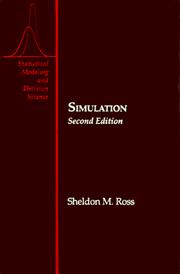
ISBN: 0125984103 Year: 1997 Publisher: San Diego : Academic Press,
Abstract | Keywords | Export | Availability | Bookmark
 Loading...
Loading...Choose an application
- Reference Manager
- EndNote
- RefWorks (Direct export to RefWorks)
Computer simulation --- Probabilities --- Random variables --- Simulation par ordinateur --- Probabilités --- Variables aléatoires --- 519.226 --- Inference and decision theory. Likelihood. Bayesian theory. Fiducial probability --- 519.226 Inference and decision theory. Likelihood. Bayesian theory. Fiducial probability --- Probabilités --- Variables aléatoires --- Chance variables --- Stochastic variables --- Variables (Mathematics) --- Probability --- Statistical inference --- Combinations --- Mathematics --- Chance --- Least squares --- Mathematical statistics --- Risk --- Computer modeling --- Computer models --- Modeling, Computer --- Models, Computer --- Simulation, Computer --- Electromechanical analogies --- Mathematical models --- Simulation methods --- Model-integrated computing
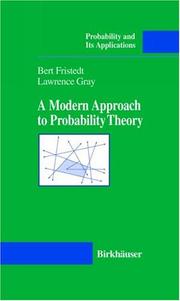
ISBN: 0817638075 3764338075 1489928391 1489928375 9780817638078 Year: 1997 Publisher: Boston (Mass.): Birkhäuser,
Abstract | Keywords | Export | Availability | Bookmark
 Loading...
Loading...Choose an application
- Reference Manager
- EndNote
- RefWorks (Direct export to RefWorks)
Overview This book is intended as a textbook in probability for graduate students in math ematics and related areas such as statistics, economics, physics, and operations research. Probability theory is a 'difficult' but productive marriage of mathemat ical abstraction and everyday intuition, and we have attempted to exhibit this fact. Thus we may appear at times to be obsessively careful in our presentation of the material, but our experience has shown that many students find them selves quite handicapped because they have never properly come to grips with the subtleties of the definitions and mathematical structures that form the foun dation of the field. Also, students may find many of the examples and problems to be computationally challenging, but it is our belief that one of the fascinat ing aspects of prob ability theory is its ability to say something concrete about the world around us, and we have done our best to coax the student into doing explicit calculations, often in the context of apparently elementary models. The practical applications of probability theory to various scientific fields are far-reaching, and a specialized treatment would be required to do justice to the interrelations between prob ability and any one of these areas. However, to give the reader a taste of the possibilities, we have included some examples, particularly from the field of statistics, such as order statistics, Dirichlet distri butions, and minimum variance unbiased estimation.
Stochastic processes --- Probabilities. --- Probabilités --- Probabilités --- Probability Theory and Stochastic Processes. --- Probability --- Statistical inference --- Combinations --- Mathematics --- Chance --- Least squares --- Mathematical statistics --- Risk
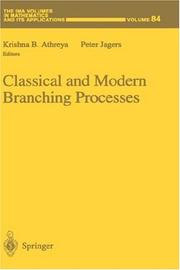
ISBN: 0387948724 1461273153 1461218624 Year: 1997 Volume: 84 Publisher: New York Springer
Abstract | Keywords | Export | Availability | Bookmark
 Loading...
Loading...Choose an application
- Reference Manager
- EndNote
- RefWorks (Direct export to RefWorks)
This IMA Volume in Mathematics and its Applications CLASSICAL AND MODERN BRANCHING PROCESSES is based on the proceedings with the same title and was an integral part of the 1993-94 IMA program on "Emerging Applications of Probability." We would like to thank Krishna B. Athreya and Peter J agers for their hard work in organizing this meeting and in editing the proceedings. We also take this opportunity to thank the National Science Foundation, the Army Research Office, and the National Security Agency, whose financial support made this workshop possible. A vner Friedman Robert Gulliver v PREFACE The IMA workshop on Classical and Modern Branching Processes was held during June 13-171994 as part of the IMA year on Emerging Appli cations of Probability. The organizers of the year long program identified branching processes as one of the active areas in which a workshop should be held. Krish na B. Athreya and Peter Jagers were asked to organize this. The topics covered by the workshop could broadly be divided into the following areas: 1. Tree structures and branching processes; 2. Branching random walks; 3. Measure valued branching processes; 4. Branching with dependence; 5. Large deviations in branching processes; 6. Classical branching processes.
Stochastic processes --- Branching processes --- Congresses --- Probabilities. --- Probability Theory and Stochastic Processes. --- Probability --- Statistical inference --- Combinations --- Mathematics --- Chance --- Least squares --- Mathematical statistics --- Risk --- Processes, Branching
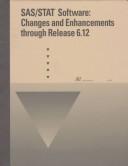
ISBN: 1555448739 Year: 1997 Publisher: Cary (N.C.) SAS Institute
Abstract | Keywords | Export | Availability | Bookmark
 Loading...
Loading...Choose an application
- Reference Manager
- EndNote
- RefWorks (Direct export to RefWorks)
Mathematical statistics --- -#WSTE:didaktiek --- Mathematics --- Statistical inference --- Statistics, Mathematical --- Statistics --- Probabilities --- Sampling (Statistics) --- Data processing --- Statistical methods --- #WSTE:didaktiek --- SAS/STAT. --- SAS/STAT (Computer file)

ISBN: 157586066X 1575860678 Year: 1997 Volume: no. 68 Publisher: Stanford, Calif. : Center for the Study of Language and Information ,
Abstract | Keywords | Export | Availability | Bookmark
 Loading...
Loading...Choose an application
- Reference Manager
- EndNote
- RefWorks (Direct export to RefWorks)
Algebraic logic. --- Probabilities. --- Algebraic logic --- Probabilities --- Probability --- Statistical inference --- Combinations --- Mathematics --- Chance --- Least squares --- Mathematical statistics --- Risk --- Logic, Symbolic and mathematical --- Logique algébrique --- Probabilités
| Listing 1 - 10 of 63 | << page >> |
Sort by
|

 Search
Search Feedback
Feedback About UniCat
About UniCat  Help
Help News
News